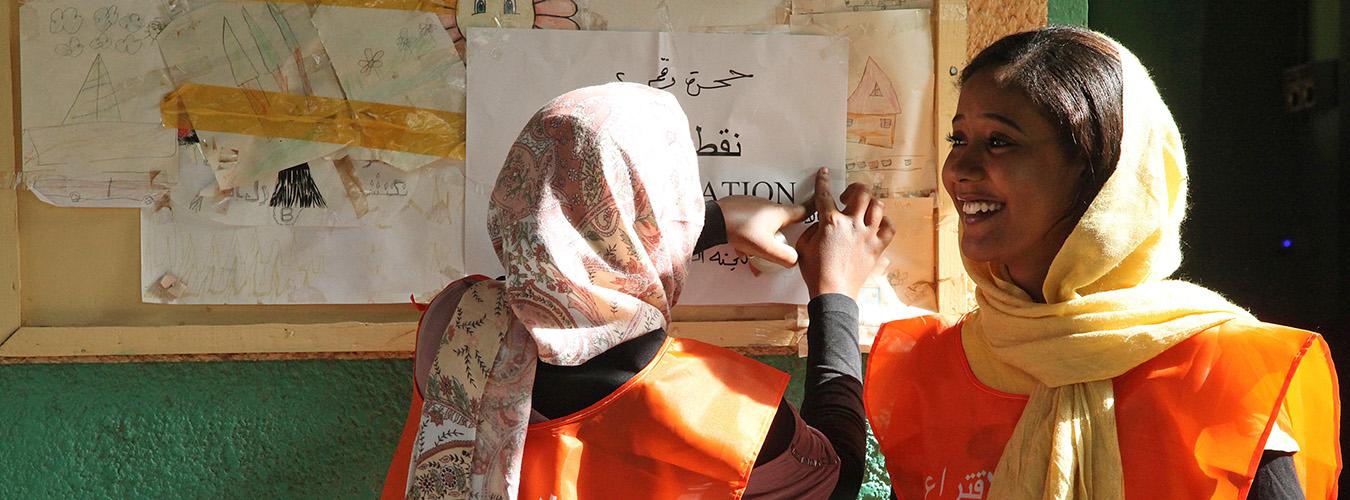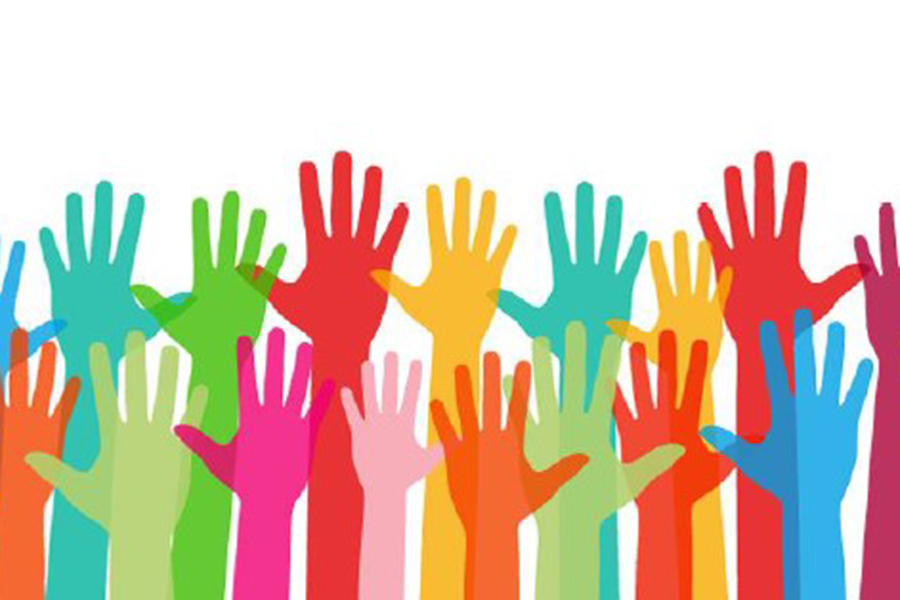
Past Events
2022
SDG Dialogues: International Day of Democracy 2022 – Protecting Press Freedom for Democracy
Watch the event
To mark International Democracy Day this year, the UN Office for Partnerships collaborates with the UN Democracy Fund to host a discussion in the SDG studio as part of the SDG Roundtable series. The conversation will showcase why protecting media freedom is a critical component of a healthy democracy. Moreover, it will propose and discuss solutions for the achievement of SDG 16 - Peace, Justice and Strong Institutions. You can contribute to this work by sharing the roundtable on 15 September and raising awareness around protecting media freedoms globally.
2020

Democracy Day in the Time of the Pandemic
A multi-stakeholder dialogue on a sustainable response to the global crisis based on multilateralism and the rule of law, on 16 September 2020.
2019
Inclusion and Participation as Foundations of Democracy
16 September
United Nations Headquarters
New York
2018
Athens Democracy Forum
16 – 18 September
Athens, Greece
Organized by The New York Times, in cooperation with the UN Democracy Fund and other partners
Message of support from the UN Secretary-General
www.athensdemocracyforum.com
2017
"In defence of democracy: The 20th anniversary of IPU’s Universal Declaration on Democracy"
15 September 2017
New York
Organized by the Inter-Parliamentary Union
Programme:
This panel discussion will highlight the Inter-Parliamentary Union’s Universal Declaration on Democracy as an international standard to guide governments, parliaments and citizens through today’s many challenges to democracy around the world. It will explore the tension within various relativist notions of democracy while discussing concrete ways to support democracy as a concept that all people everywhere can appropriate as theirs.
Panellists:
-
Hon. Sven Spengemann, MP, House of Commons of Canada, Member of the IPU Standing Committee on Democracy and Human Rights
-
Ambassador Pennelope Beckles, Permanent Representative of Trinidad and Tobago to the United Nations
-
Mr. Miroslav Jenca, Assistant Secretary General, Department of Political Affairs, United Nations
-
Ms. Nermeen Shaikh, Co-host and Producer, Democracy Now!
2016
In September 2015, all 193 Member States of the United Nations adopted the 2030 Agenda for Sustainable Development -- a plan for achieving a better future for all, laying out a path over 15 years to end extreme poverty, fight inequality and injustice, and protect our planet. At the heart of the Agenda are the Sustainable Development Goals, which call for mobilizing efforts to end all forms of poverty, fight inequalities and tackle climate change, while ensuring that no one is left behind.
New York
Thursday, 15 September 2016
“Democracy and the 2030 Agenda for Sustainable Development”
Organized by the United Nations Working Group on Democracy (a sub-group of the United Nations Executive Committee on Peace and Security)
Programme:
Remarks by:
- Under-Secretary-General David Nabarro, Special Adviser of the Secretary-General on the 2030 Agenda for Sustainable Development
- Ms. Paddy Torsney, Permanent Observer to the United Nations of the Inter-Parliamentary Union
- Mr. Diego Firpo, Chief Executive Officer, Un Techo para mi País
- Moderator: Ms. Teresa Whitfield, Officer in Charge, Policy and Mediation Division, UN Department of Political Affairs
2015
Globally, the role of civil society has never been more important than this year, as the world prepares to implement a new development agenda, agreed to by all the world’s Governments. However, for civil society activists and organizations in a range of countries covering every continent, space is shrinking — or even closing — as some Governments have adopted restrictions that limit the ability of NGOs to work or to receive funding.
That is why the theme of this year’s International Day of Democracy is "Space for Civil Society." It is a reminder to Governments everywhere that the hallmark of successful and stable democracies is the presence of a strong and freely operating civil society -- in which Government and civil society work together for common goals for a better future, and at the same time, civil society helps keep Government accountable.
New York
Tuesday, September 15, 2015
"Space for Civil Society"
Organised by the United Nations Working Group on Democracy (a sub-group of the United Nations Executive Committee on Peace and Security), in cooperation with International IDEA (Institute for Democracy and Electoral Assistance).
Programme:
- Video message by UN Secretary-General Ban Ki-moon
- Remarks by the Permanent Representatives / Deputy Permanent Representatives of Bhutan, Chile, Poland, Sierra Leone and Sweden
- Discussion with:
Nilda Bullain, Vice-President, International Center for Not-for-Profit Law
Arthur Larok, Co-Chair, ActionAid International Working Group on Civic and Political Space - Moderator: James Traub, Fellow, Center on International Cooperation; Columnist, ForeignPolicy.com
2014
This year's theme - Engaging Young People on Democracy - highlights the challenges and opportunities of young people engaging in democratic processes. People between the ages of 15 and 25 constitute a fifth of the world’s population. In many developing countries, the proportion is even higher – with the majority of young people today living in low - and middle-income countries.
Yet study after study shows declining faith among young people in politics as we know it, with decreasing levels of participation in elections, political parties and traditional social organizations across the world. This applies to both established and emerging democracies.
The Inter-Parliamentary Union is promoting the International Day of Democracy through its Member Parliaments in 162 countries around the world.
2013
The subject of this year's theme -- Strengthening Voices for Democracy -- aims to shine a spotlight on the importance of people's voices, both expressed directly and through their elected representatives, in today's political, economic, social, developmental, environmental and technological debates. The ability of people to raise their voices and decide how they are governed lies at the heart of democracy.
The Inter-Parliamentary Union is promoting the International Day of Democracy through its Member Parliaments in 162 countries around the world.
2012
The subject of the year's theme -- democracy education -- is essential for the long-term success of democracy. All citizens in all nations need to fully understand their rights and responsibilities, especially in countries that have recently transitioned to more democratic societies. Questions such as, “Why should I vote?”, “How can I influence my leaders?” “What can I reasonably expect from my elected officials?” or “What are my constitutional rights?” need to be addressed through civic institutions, in the free press and in classrooms. It is only with educated citizens that a sustainable culture of democracy can emerge.
To mark the International Day of Democracy at UN Headquarters, the UN Democracy Fund (UNDEF), the UN Institute for Training and Research (UNITAR, New York Office), and the Council for a Community of Democracies joined with the Permanent Missions of Mongolia and Poland, the Organization of American States, and the UN Educational, Scientific and Cultural Organization (UNESCO) at a panel discussion on democracy education on 17 September.
The event coincided with the launch of a new UNDEF-funded project to put democracy education into wider practice.
2011
The 2011 International Day of Democracy coincided with the observance at UN Headquarters of the International Day of Peace, under the theme of "Peace and Democracy: Make Your Voice heard".
Following the traditional Peace Bell Ceremony in the morning, an event for youth was held in Conference Room 4, North Lawn Building, with the participation of the Secretary-General as well as Messengers of Peace Michael Douglas, Jane Goodall and Stevie Wonder, UNICEF Goodwill Ambassadors Yuna Kim and Ishmael Beah, and UN Youth Champion Monique Coleman.
The event also featured a screening of 'Young People Building Democracy and Peace in Guatemala', a short film illustrating a field project of the United Nations Democracy Fund, UNDEF.
2010
UN General Assembly interactive debate
A panel discussion on “Democracy and the Millennium Development Goals” was co-organized by the International Conference of New and Restored Democracy and the Permanent Mission of the Bolivarian Republic of Venezuela.
UN Democracy Fund donor event
Government donors to the UN Democracy Fund spoke at an event on the International Day of Democracy about their individual countries’ journeys towards democratic governance, reflected on the challenges ahead, and reaffirmed their commitment to UNDEF as a unique tool to strengthen democratic processes and values at the grassroots of societies around the world.
Worldwide Democracy Photo Challenge
The Democracy Photo Challenge, a worldwide competition that engages people around the world in a global dialogue on democracy, launched the 12 winning photos in an exhibition in the South Gallery of the Visitors’ Lobby on 15 September, the International Day of Democracy. Press release
2009
The winners of a global online video competition aimed at engaging people in a conversation centred on democracy were announced at a gathering at UN Headquarters in New York.
Over 900 contestants from 95 countries submitted videos completing the phrase “Democracy is …”. Press release announcing video competition
2008 - The First International Day of Democracy
According to information provided by the Inter-Parliamentary Union (IPU), the first International Day of Democracy was observed by 46 national parliaments. Events included the adoption of a resolution marking the day in Uruguay, television and radio programmes in Namibia, an “open doors” day in Indonesia, the organization of a seminar on the role of Parliament in Thailand’s political reform and an exhibition to promote concepts of democracy by Thailand and a special session of the Greek Parliament in Athens, which was attended by the then IPU President Pier Ferdinando Casini. Events that sought to bring the public, especially young people, into contact with parliament — such as an open doors day, a special debate or an exhibition — were among the most common forms of celebration. Thailand also designated 15 to 19 September 2008 as “Democracy Awareness Week”.
At UN Headquarters, the outgoing President of the General Assembly, Srgjan Kerim, in close collaboration with the Chair of the Sixth International Conference, the Government of Qatar, organized an informal session of the General Assembly on 15 September 2008. Speakers included the outgoing President of the General Assembly, the former President of Chile, Ricardo Lagos, who gave the keynote address, the Permanent Representative of Qatar to the United Nations (as the main sponsor of resolution 62/7), the Permanent Representative of Portugal to the United Nations (as Chair of the Community of Democracies) and the Secretary-General.
